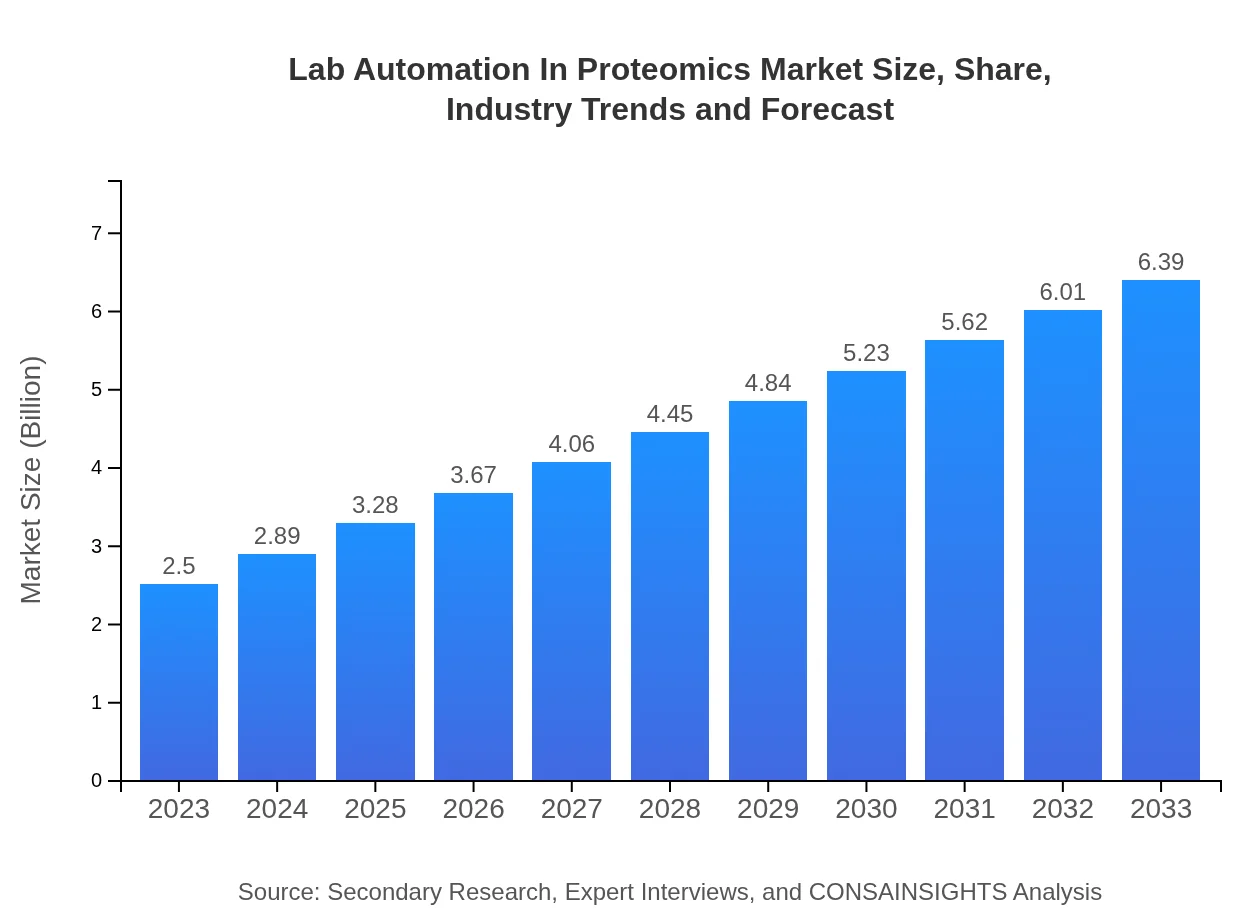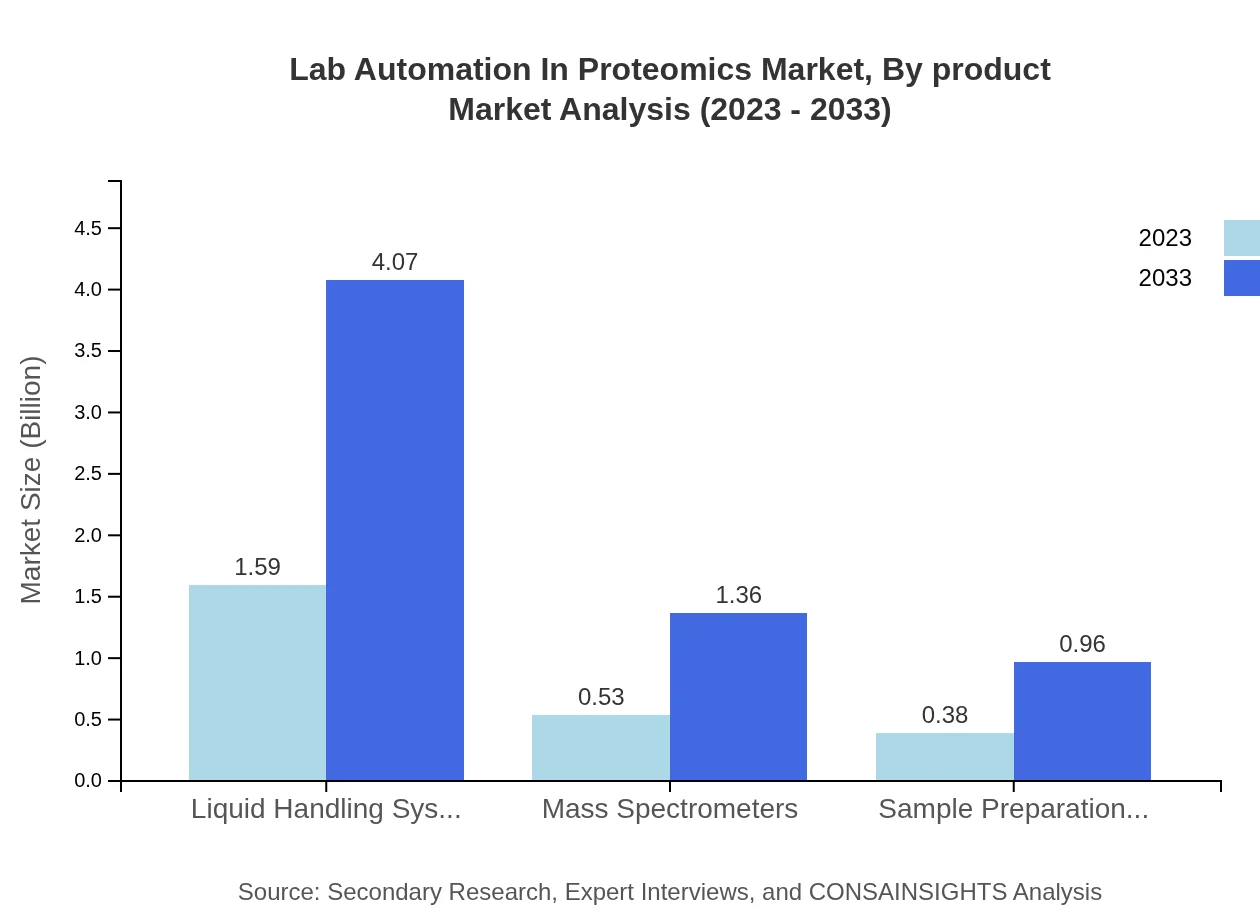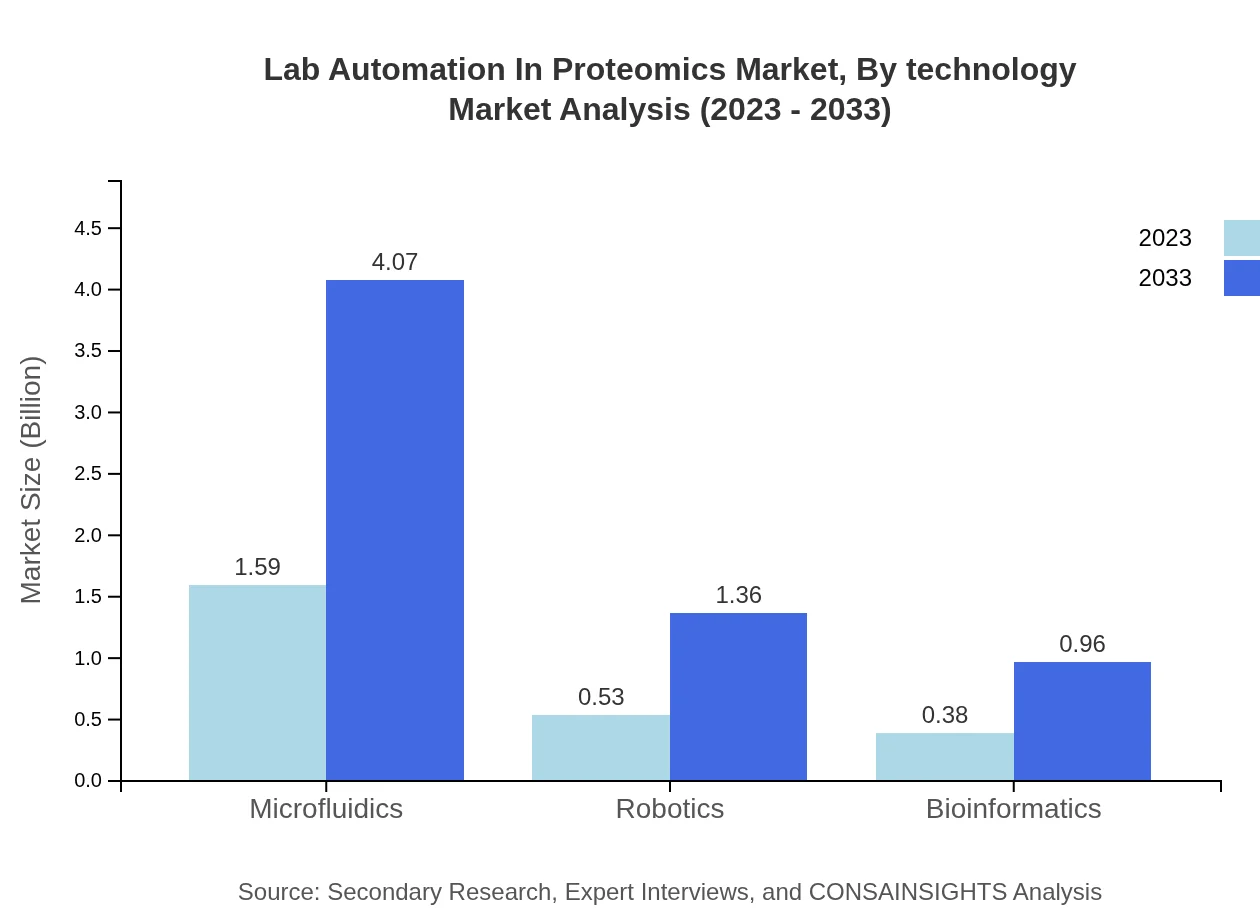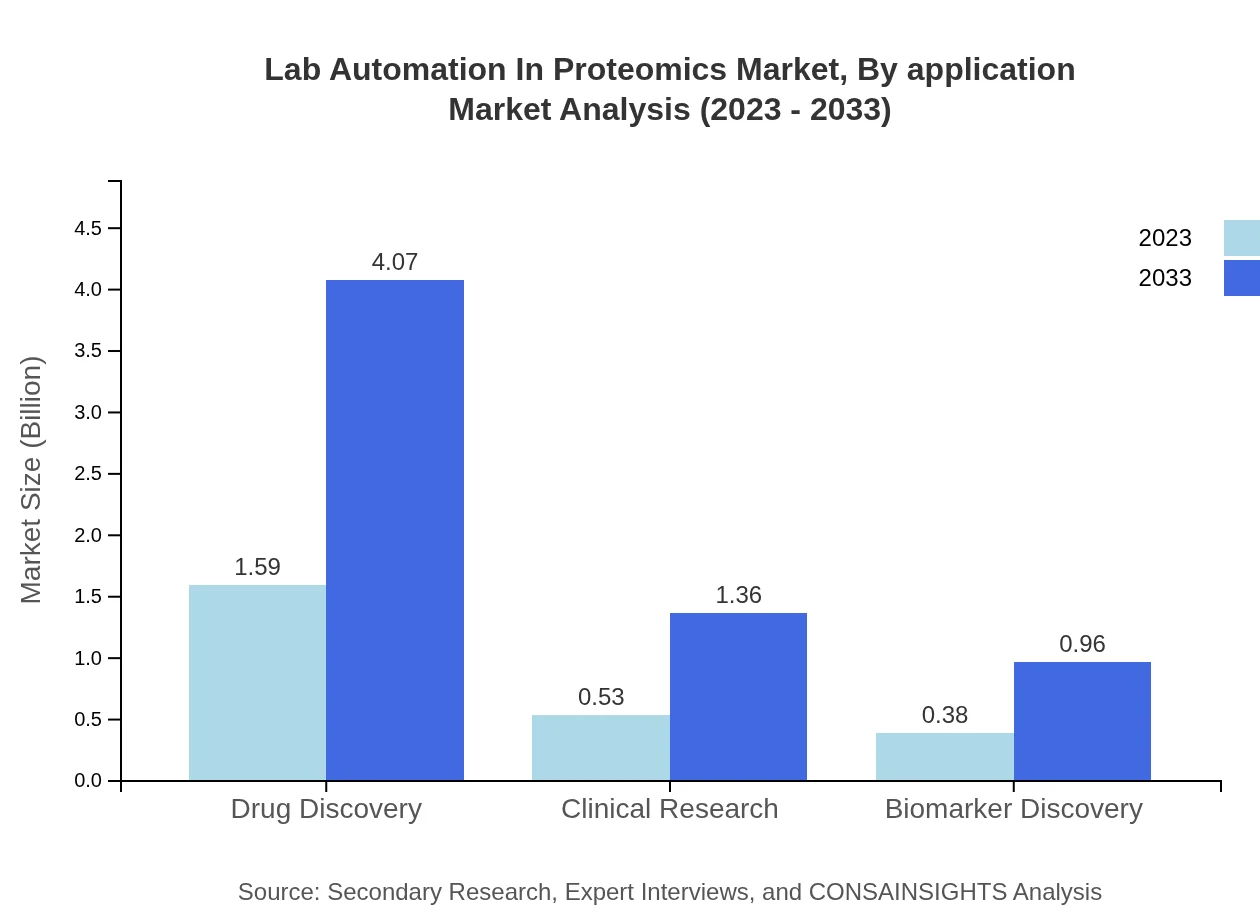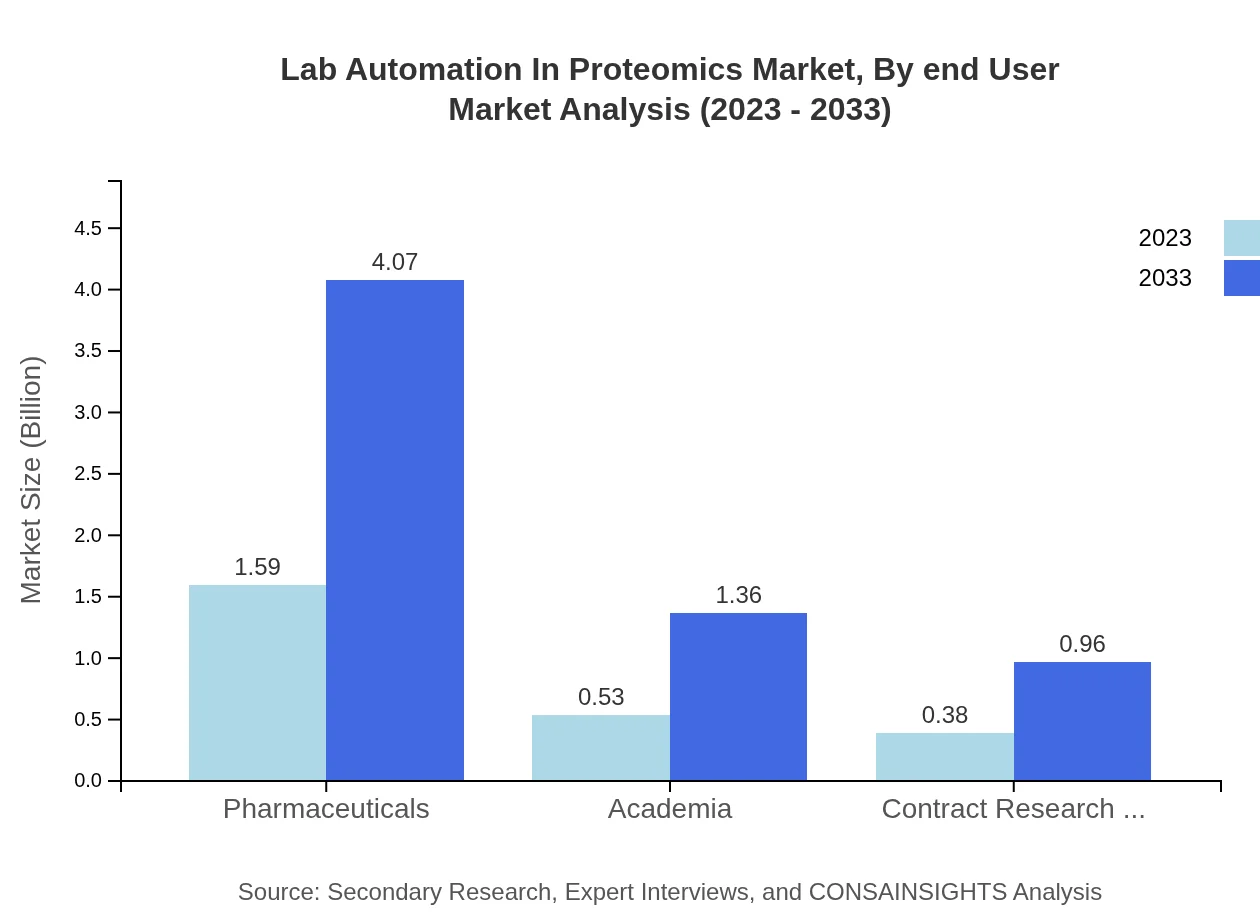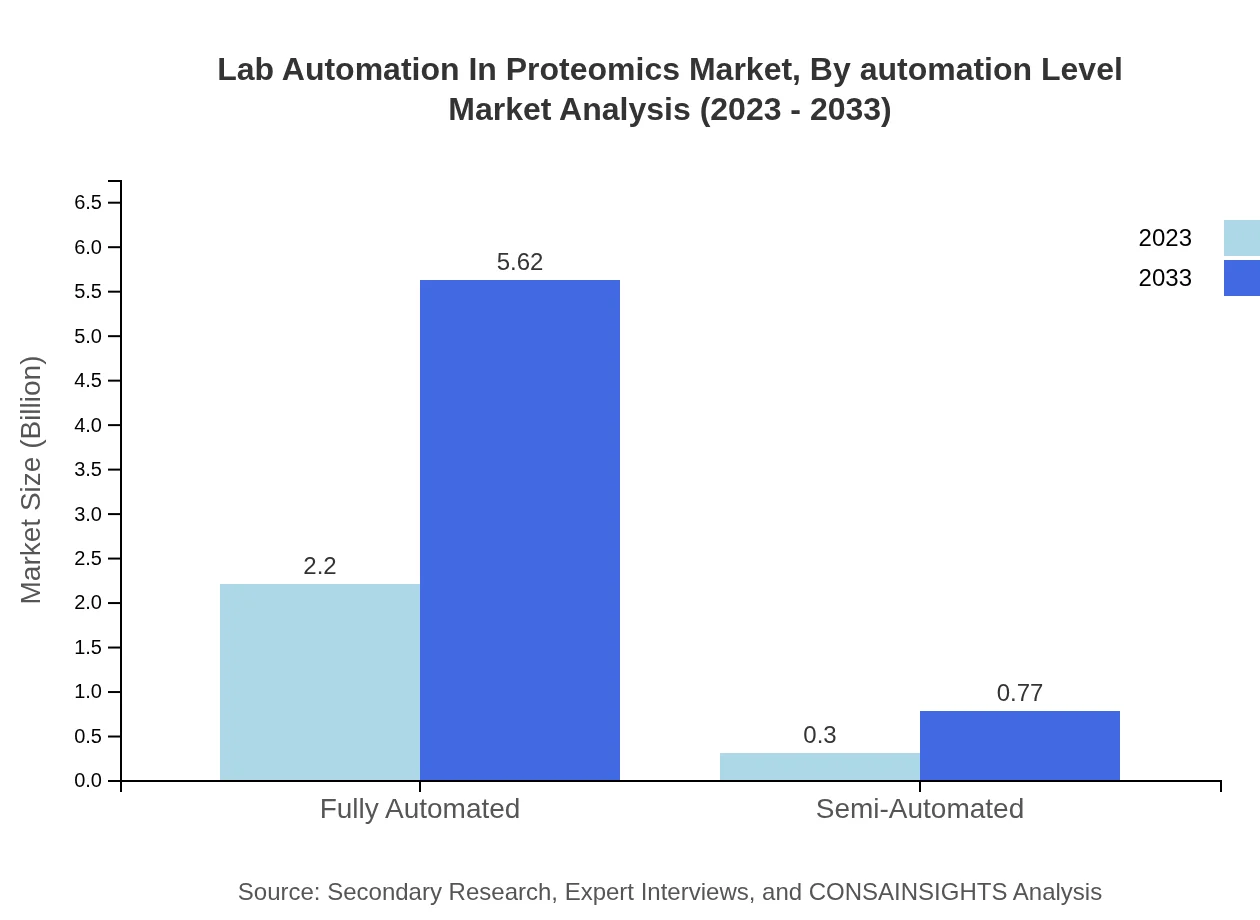Lab Automation In Proteomics Market Report
Published Date: 22 January 2026 | Report Code: lab-automation-in-proteomics
Lab Automation In Proteomics Market Size, Share, Industry Trends and Forecast to 2033
This report delves into the Lab Automation in Proteomics market, offering insights into market trends, size, and forecasts from 2023 to 2033. It explores various dimensions including segmentation, regional analysis, and key players to provide a comprehensive understanding of this evolving field.
| Metric | Value |
|---|---|
| Study Period | 2023 - 2033 |
| 2023 Market Size | $2.50 Billion |
| CAGR (2023-2033) | 9.5% |
| 2033 Market Size | $6.39 Billion |
| Top Companies | Thermo Fisher Scientific, Agilent Technologies, PerkinElmer, Bio-Rad Laboratories, Beckman Coulter |
| Last Modified Date | 22 January 2026 |
Lab Automation In Proteomics Market Overview
Customize Lab Automation In Proteomics Market Report market research report
- ✔ Get in-depth analysis of Lab Automation In Proteomics market size, growth, and forecasts.
- ✔ Understand Lab Automation In Proteomics's regional dynamics and industry-specific trends.
- ✔ Identify potential applications, end-user demand, and growth segments in Lab Automation In Proteomics
What is the Market Size & CAGR of Lab Automation In Proteomics market in 2023?
Lab Automation In Proteomics Industry Analysis
Lab Automation In Proteomics Market Segmentation and Scope
Tell us your focus area and get a customized research report.
Lab Automation In Proteomics Market Analysis Report by Region
Europe Lab Automation In Proteomics Market Report:
Europe's market is projected to grow from USD 0.87 billion in 2023 to USD 2.22 billion by 2033. The region's focus on personalized medicine and significant investments in life sciences are key drivers.Asia Pacific Lab Automation In Proteomics Market Report:
In the Asia Pacific region, the Lab Automation in Proteomics market is poised for significant growth, expanding from USD 0.44 billion in 2023 to USD 1.14 billion by 2033. The rise is driven by increasing research activities and investments by governments in biotechnology and healthcare.North America Lab Automation In Proteomics Market Report:
North America is anticipated to see substantial growth, with market size increasing from USD 0.84 billion in 2023 to USD 2.14 billion by 2033. The region's robust funding in biotech research and development and presence of key market players contribute significantly to this expansion.South America Lab Automation In Proteomics Market Report:
The South American market is expected to grow from USD 0.17 billion in 2023 to USD 0.44 billion by 2033. This growth is fueled by the emerging biotechnology sector and increasing collaboration with international research institutions.Middle East & Africa Lab Automation In Proteomics Market Report:
In the Middle East and Africa region, the market is expected to increase from USD 0.18 billion in 2023 to USD 0.45 billion by 2033, supported by advancements in healthcare infrastructure and research capabilities in the region.Tell us your focus area and get a customized research report.
Lab Automation In Proteomics Market Analysis By Product
The liquid handling systems segment leads the market, reaching USD 1.59 billion in 2023 and projected to exceed USD 4.07 billion by 2033, showcasing a market share of 63.63%. Mass spectrometers follow, growing from USD 0.53 billion to USD 1.36 billion, equivalent to a 21.34% market share. Additionally, sample preparation kits are also gaining traction with expected growth from USD 0.38 billion to USD 0.96 billion, holding a 15.03% share.
Lab Automation In Proteomics Market Analysis By Technology
In terms of technology, fully automated processes dominate the landscape with a current market size of USD 2.20 billion in 2023, projected to grow to USD 5.62 billion by 2033, reflecting an 87.91% share. In contrast, semi-automated solutions, currently at USD 0.30 billion, are anticipated to increase to USD 0.77 billion, holding the remaining 12.09% of the market.
Lab Automation In Proteomics Market Analysis By Application
The drug discovery application segment is a major market driver, expected to grow from USD 1.59 billion to USD 4.07 billion by 2033, representing 63.63% of the market. Clinical research and biomarker discovery applications also show potential growth, moving from USD 0.53 billion to USD 1.36 billion.
Lab Automation In Proteomics Market Analysis By End User
The pharmaceuticals sector is leading in end-user applications, with growth from USD 1.59 billion in 2023 to USD 4.07 billion in 2033, maintaining a 63.63% market share. Academia also plays a significant role, expected to grow from USD 0.53 billion to USD 1.36 billion, reflecting a 21.34% share.
Lab Automation In Proteomics Market Analysis By Automation Level
The growth of fully automated systems continues to dominate the automation level segment, currently valued at USD 2.20 billion, projected to rise to USD 5.62 billion by 2033, representing a significant share. Semi-automated processes, while smaller, are expected to see growth from USD 0.30 billion to USD 0.77 billion.
Lab Automation In Proteomics Market Trends and Future Forecast
Tell us your focus area and get a customized research report.
Global Market Leaders and Top Companies in Lab Automation In Proteomics Industry
Thermo Fisher Scientific:
A leading manufacturer of scientific instrumentation, Thermo Fisher specializes in mass spectrometry and automated systems that enhance laboratory workflows.Agilent Technologies:
Agilent is known for its cutting-edge laboratory instrumentation and solutions that facilitate proteomics research, particularly in the fields of genomics and drug discovery.PerkinElmer:
PerkinElmer offers advanced technologies and automation solutions that support proteomics initiatives in diverse laboratories globally.Bio-Rad Laboratories:
Bio-Rad is recognized for its life science research products, including liquid handling systems and diagnostic tools that capitalize on automation.Beckman Coulter:
Beckman Coulter specializes in laboratory automation and robotics, whose innovations greatly contribute to efficiency in proteomics workflows.We're grateful to work with incredible clients.









FAQs
What is the market size of lab automation in proteomics?
The global lab automation in proteomics market is valued at approximately $2.5 billion in 2023, with a projected CAGR of 9.5% over the next decade, indicating significant growth potential.
What are the key market players or companies in the lab automation in proteomics industry?
Key players in the lab automation in proteomics market include Siemens Healthineers, Agilent Technologies, Thermo Fisher Scientific, and Waters Corporation, among others, all contributing to technological advancements and market expansion.
What are the primary factors driving the growth in the lab automation in proteomics industry?
Key factors fueling growth include increased demand for precision medicine, advancements in robotic and AI technologies, and the rising need for high-throughput analysis in research and pharmaceutical applications.
Which region is the fastest Growing in lab automation in proteomics?
Asia Pacific is the fastest-growing region, expected to expand from $0.44 billion in 2023 to $1.14 billion by 2033, driven by increasing investment in healthcare infrastructure and biotechnological innovations.
Does ConsaInsights provide customized market report data for the lab automation in proteomics industry?
Yes, Consainsights offers customized market reports tailored to specific client needs, allowing businesses to gain insights and data relevant to their unique positions in the lab automation in proteomics market.
What deliverables can I expect from this lab automation in proteomics market research project?
Expect comprehensive deliverables including market sizing, trend analysis, competitive landscape, regional insights, and sector-specific growth opportunities outlined in a structured report.
What are the market trends of lab automation in proteomics?
Key trends include the growth of fully automated systems, integration of AI in workflows, and increased collaboration between academia and industry, enhancing research capabilities and operational efficiency.

